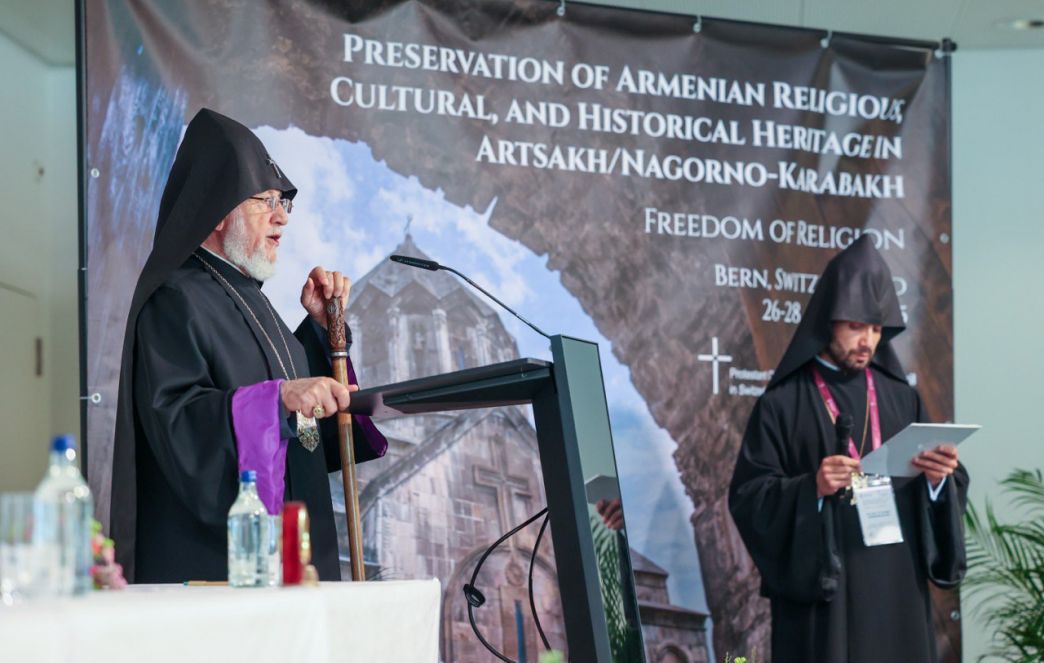International Conference in Bern Addresses Preservation of Armenian Spiritual and Cultural Heritage in Artsakh

armenianchurch.org
OCP News Service – 31/05/2025
Bern – Switzerland: An international conference titled “Religious Freedom: Preserving the Armenian Spiritual, Cultural, and Historical Heritage in Artsakh/Nagorno-Karabakh” opened yesterday, May 26, in Bern, Switzerland. Initiated by His Holiness Karekin II, Supreme Patriarch and Catholicos of All Armenians, the event is organized by the World Council of Churches (WCC) and the Protestant Church of Switzerland and concludes on May 28.
The conference officially commenced on May 27 with a blessing and message from His Holiness the Catholicos of All Armenians. He extended gratitude to Rev. Dr. Jerry Pillay, General Secretary of the WCC; Rev. Rita Famos, President of the Protestant Church of Switzerland; and all organizers, whose efforts have once again brought the challenges faced by the Armenian people in the aftermath of the occupation of Artsakh/Nagorno-Karabakh to the international stage.
Catholicos Karekin II sorrowfully noted the “genocidal acts and ethnic cleansing” witnessed in the 21st century, fueled by war and hatred, and expressed deep concern over “deplorable violations of religious freedom and fundamental human rights” against the Armenian people due to Azerbaijan’s aggression, supported by Turkey. He highlighted that during the 2020 44-day war and 2023 military operations, Artsakh was occupied and entirely emptied of its Armenian population, with significant territories seized and new demands continuously imposed.
His Holiness condemned Azerbaijan’s continued holding of Artsakh’s political leadership, civilians, and prisoners of war, subjecting them to “show trials and fabricated charges,” which he described as gross violations of international law driven by ethnic hatred and anti-Armenian sentiment. This animus, he stated, also underlies the assaults on Armenian spiritual and cultural heritage. He lamented the “barbaric destruction of Armenian monuments, Christian shrines, settlements, and cemeteries” since the occupation, and Azerbaijan’s “cunning reclassifying” of historic Armenian monasteries and churches as “Albanian” heritage to erase Armenian identity.
The Catholicos pointed out Azerbaijan’s persistent disregard for international appeals, including its refusal to comply with the European Parliament’s 2022 Resolution No. 2582 on cultural heritage destruction in Nagorno-Karabakh and its rejection of UNESCO’s fact-finding mission initiative. He also criticized Sheikh-ul-Islam Allahshukur Pashazade, head of the Caucasus Muslim Board, for “false and slanderous statements,” drawing parallels to the destruction of Armenian holy sites in Nakhijevan, including the total demolition of some six thousand monument cross-stones (khachkars) in Old Jugha in 2005.
Emphasizing that cultural crimes transcend geographical boundaries, His Holiness stated that “Assaults on cultural heritage are rightly regarded not merely as offenses against a single nation but as crimes against universal human values.” He warned that impunity for such acts sets a dangerous precedent.
Addressing the conference participants, Catholicos Karekin II stressed the urgent priority of protecting Artsakh’s spiritual, cultural, and historical heritage. He called upon the international community to take effective measures to preserve this heritage, ensure the safe return of Armenians to their ancestral homeland, restore their rights and dignity, and secure the swift release of Armenian captives.
In conclusion, His Holiness thanked sister Churches and ecumenical organizations for their unwavering support and commitment to defending the rights of Artsakh Armenians, wishing the conference fruitful deliberations.
The conference concluded with a Final Statement on May 28, building upon principles of human dignity, freedom of religion, and cultural rights, and drawing on international legal frameworks like the 1954 Hague Convention.
Key points from the Final Statement (Bern, May 27–28, 2025):
- Acknowledged Tragic Loss: Deep sorrow was expressed for the forced displacement of over 120,000 ethnic Armenians from Artsakh/Nagorno Karabakh after the September 2023 military assault and blockade, and the widespread destruction of Armenian Christian sites.
- Reaffirmed Moral and Legal Imperatives: The destruction of cultural heritage was reaffirmed as a violation of international humanitarian law, potentially amounting to a crime against humanity and indicating genocidal intent. Calls were made for accountability from the UN and UNESCO, and for the right of return for displaced populations.
- Emphasized Spiritual and Interfaith Responsibility: Protection of heritage was linked to the living expression of faith, identity, and memory. Religious leaders from Christian, Jewish, Muslim, and Yezidi traditions affirmed that preserving religious heritage is an expression of shared humanity and a path to reconciliation.
- Called for Coordinated International Action: Urgent appeals were made for:
- A UNESCO independent monitoring mission to assess Armenian cultural and religious sites in Artsakh.
- Governments and international bodies (e.g., Switzerland) to take diplomatic and legal steps to prevent further erasure of Armenian heritage, support the return of people, and work for the liberation of Armenian hostages in Baku.
- Churches and ecumenical organizations worldwide to continue advocacy.
- WCC to lead planning for an ecumenical pilgrimage visit to Armenian holy sites in Artsakh.
- Academic and cultural institutions to enhance documentation and prevent distortion of historical narratives.
- Media to report in-depth on the crisis.
- Learning from the Past, Acting for the Future: Lessons from other cases of cultural destruction (Cyprus, Greece, Iraq) were highlighted, emphasizing heritage as a source of reconciliation when protected, but a deepening of trauma when destroyed.
- Common Commitments: Participants committed to sustained advocacy, building interreligious coalitions, supporting transitional justice, and mobilizing institutions to uphold the sacredness of traditions.
The statement concluded by emphasizing that the heritage of Artsakh/Nagorno Karabakh belongs to all humanity and is a collective responsibility to protect.
Source:
OCP News Service
